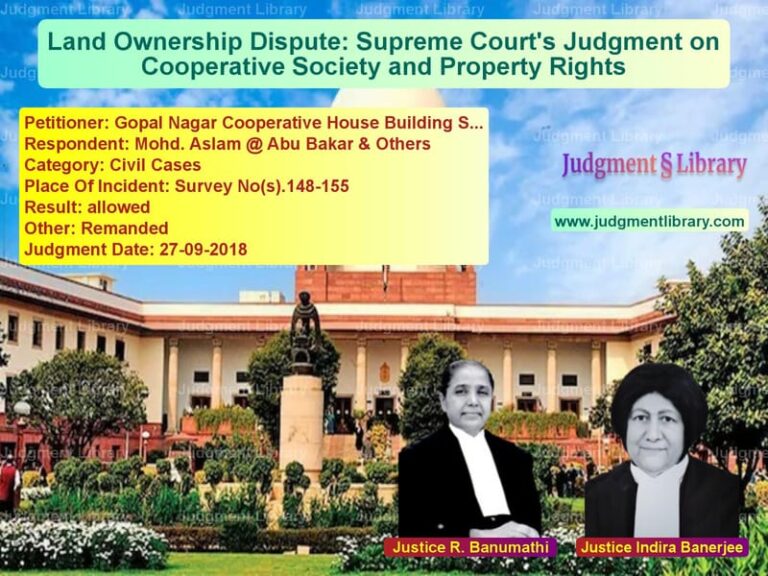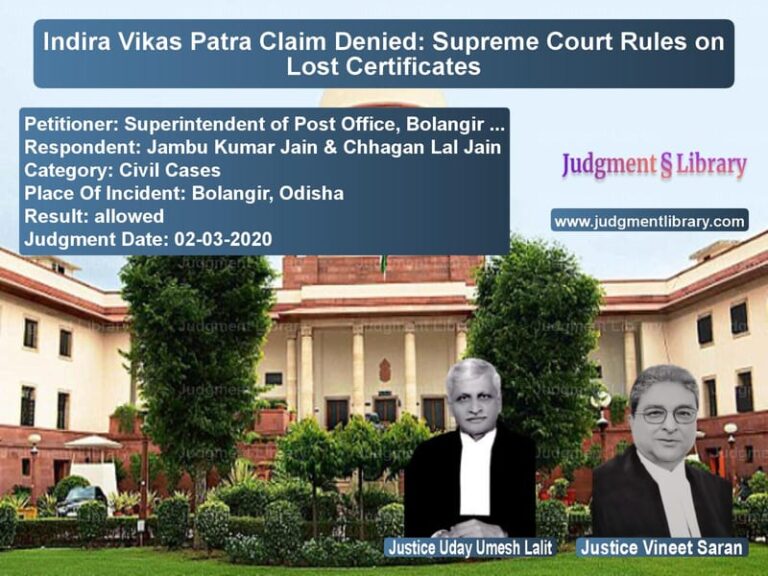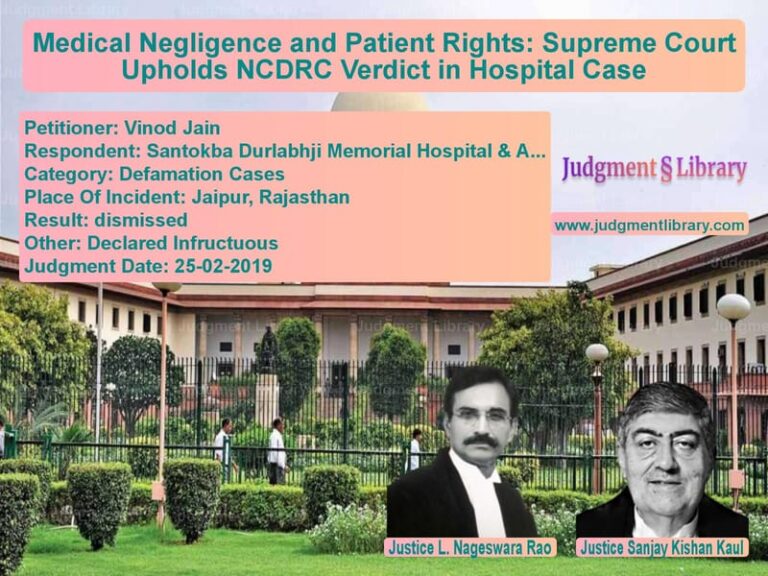Grant-in-Aid Claims for Educational Institutions: Supreme Court Ruling on Legal Entitlement
The Supreme Court of India recently delivered a significant judgment regarding the entitlement of employees in non-government educational institutions to claim grant-in-aid benefits. The case, involving multiple appeals, primarily revolved around whether employees could demand financial benefits under the repealed Orissa (Non-Government Colleges, Junior Colleges, and Higher Secondary Schools) Grant-in-Aid Order, 1994, despite its repeal in 2004. The judgment holds immense importance for private educational institutions, government funding policies, and employee entitlements.
The primary legal issue was whether employees were entitled to claim grant-in-aid under the repealed 1994 Order or whether they were bound by subsequent policies that introduced the block grant system. The Supreme Court’s ruling provides clarity on how repealed laws affect pending claims and the extent of financial obligations the state holds toward private educational institutions.
Background of the Grant-in-Aid Policy in Odisha
Historically, the State of Odisha provided financial aid to private educational institutions through various government orders. Before 1994, grant-in-aid was provided under ad-hoc administrative directions issued under the Orissa Education Act, 1969. The Orissa (Non-Government Colleges, Junior Colleges, and Higher Secondary Schools) Grant-in-Aid Order, 1994, structured and formalized this process. However, due to financial constraints, the 1994 Order was repealed in 2004, introducing a block grant system instead of full salary reimbursement.
The shift from the grant-in-aid system to block grants was aimed at limiting the government’s financial liability. The block grant provided a fixed amount instead of covering full salary expenses. This change led to multiple litigations, as employees in educational institutions argued that their entitlement to the earlier grant-in-aid benefits was a vested right that could not be taken away retrospectively.
Key Legal Questions in the Case
- Whether employees who completed the qualifying period for grant-in-aid before 2004 could still claim benefits under the repealed 1994 Order.
- Whether the introduction of the block grant system in 2004 nullified all pending or unclaimed entitlements under the earlier scheme.
- Whether the financial commitments made by the state government before the repeal of the 1994 Order continued to bind it despite the new policy.
- Whether the principles of legitimate expectation and non-retrospective application of laws applied to employees affected by the shift from the grant-in-aid system to the block grant framework.
Arguments by the State of Odisha (Petitioners)
The State of Odisha, represented by its legal counsel, strongly contested the claims of the employees, presenting the following key arguments:
- The 1994 Order was repealed in 2004, and as per legal principles, no benefits could be claimed under a repealed law.
- The financial commitments of the state were subject to economic capacity, and the block grant system was a policy decision to manage fiscal constraints.
- Employees had not filed claims in a timely manner. The claims were made in 2011 and 2012, almost a decade after the repeal of the 1994 Order, making them legally unsustainable.
- The government had discretion over budget allocations for private institutions, and the grant-in-aid system was not an automatic right.
- The High Court of Odisha, in Loknath Behera v. State of Odisha, had already ruled that grant-in-aid claims could not be entertained under a repealed law.
Arguments by the Employees (Respondents)
The employees, through their legal representatives, countered the state’s arguments with the following key points:
- They had completed the qualifying period under the 1994 Order and were entitled to receive grant-in-aid benefits before the policy changed in 2004.
- The government’s decision to repeal the 1994 Order could not retrospectively cancel rights that had already accrued to the employees.
- Similar claims had been entertained by courts in previous cases, and denying relief now would be discriminatory.
- The government had already approved some employees for partial grant-in-aid under the 2008 Order, indicating recognition of their entitlement.
- The principles of legitimate expectation and fairness required that employees who had worked under the expectation of grant-in-aid benefits should not be denied them arbitrarily.
Supreme Court’s Ruling
The Supreme Court delivered a detailed judgment analyzing the provisions of the Orissa Education Act, 1969, the 1994, 2004, and 2008 Grant-in-Aid Orders, and judicial precedents. The Court held:
- Grant-in-aid is not an automatic right and is subject to government discretion based on financial capacity.
- Claims for grant-in-aid benefits cannot be made under the repealed 1994 Order after the implementation of the 2004 and 2008 Orders.
- The introduction of the block grant system replaced the earlier grant-in-aid mechanism, and claims had to be evaluated under the new policy framework.
- Merely completing the qualifying period under the 1994 Order does not guarantee entitlement to benefits if the order itself has been repealed.
- The government’s economic capacity and financial planning considerations must be respected, and courts cannot direct retrospective payments that strain public finances.
Final Verdict
The Supreme Court allowed the appeals filed by the State of Odisha and dismissed the employees’ claims. The Court reaffirmed the principle that grant-in-aid claims must align with existing legal provisions and cannot be sought under repealed laws.
The judgment sets a clear precedent that policies governing financial aid to private institutions can be revised based on economic considerations, and vested rights do not extend beyond the validity period of a repealed law. The decision also emphasizes that mere expectations of financial aid do not translate into enforceable legal rights.
Implications of the Judgment
The Supreme Court’s decision has far-reaching implications:
- For Private Educational Institutions: Institutions must align their financial planning with the latest government policies and should not assume continuation of earlier benefits.
- For Employees: The ruling clarifies that employees cannot claim grant-in-aid retrospectively under repealed laws, reinforcing the importance of timely legal action.
- For Government Policy: The judgment affirms the government’s right to revise financial policies based on economic feasibility.
Conclusion
This judgment is a landmark decision in the realm of financial aid for private educational institutions. It highlights the importance of policy consistency, economic considerations, and judicial discipline in dealing with claims under repealed laws. The ruling ensures that financial commitments of the government remain sustainable while balancing the rights and expectations of employees in the education sector.
Petitioner Name: State of Odisha & Another.Respondent Name: Anup Kumar Senapati & Another.Judgment By: Justice Arun Mishra, Justice S. Abdul Nazeer, Justice M.R. Shah.Place Of Incident: Odisha.Judgment Date: 16-09-2019.
Don’t miss out on the full details! Download the complete judgment in PDF format below and gain valuable insights instantly!
Download Judgment: State of Odisha & An vs Anup Kumar Senapati Supreme Court of India Judgment Dated 16-09-2019.pdf
Direct Downlaod Judgment: Direct downlaod this Judgment
See all petitions in Employment Disputes
See all petitions in Public Sector Employees
See all petitions in Pension and Gratuity
See all petitions in Judgment by Arun Mishra
See all petitions in Judgment by S. Abdul Nazeer
See all petitions in Judgment by Mukeshkumar Rasikbhai Shah
See all petitions in allowed
See all petitions in supreme court of India judgments September 2019
See all petitions in 2019 judgments
See all posts in Service Matters Category
See all allowed petitions in Service Matters Category
See all Dismissed petitions in Service Matters Category
See all partially allowed petitions in Service Matters Category







